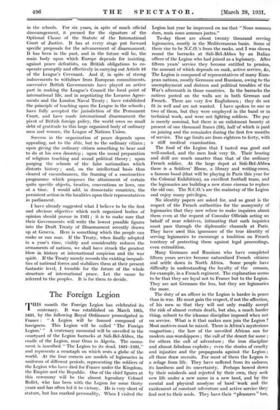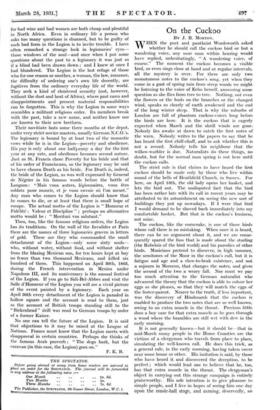The Foreign Legion
THIS month the Foreign Legion has celebrated its centenary. It was established on March 10th, 1881, by the following Royal Ordinance promulgated in France : "A Legion will be formed composed of foreigners. This Legion will be called 'The Foreign Legion.'" A centenary memorial will be unveiled in the courtyard of the Legion barracks at Sidi-Bel-Abbes, the cradle of the Legion, near Oran in Algeria. The monu- ment is inscribed "The Legion to its dead, 1831-1931," and represents a cenotaph on which rests a globe of the world. At the four corners are models of legionaries in uniforms of different periods, representing the soldiers of the Legion who have died for France under the Kingdom, the Empire and the Republic. One of the chief figures at this ceremony will be the almost legendary Colonel Rollet, who has been with the Legion for some thirty years and has often led it to victory. He is very short of stature, but has marked personality. ' When I visited the Legion last year he impressed on me that " Nous sommes • durs, mais nous sommes justes."
To-day there are about twenty thousand serving legionaries, mostly in the Mediterranean basin. Some of them rise to be N.C.O.'s from the ranks, and I was shown round the barracks at Sidi-Bel-Abbes by an Italian officer of the Legion who had joined as a legionary. After fifteen years' service they become entitled to pension, the amount of which depends on rank, active service, &c. The Legion is composed of representatives of many Euro- pean nations, mostly Germans and Russians, owing to the unemployment and distress and political troubles of the War's aftermath in those countries. In the barracks the notices posted on the walls are in both German and French. There are very few Englishmen ; they do not fit in well and are not wanted. I have spoken to one or two of them, but they were employed in the band or in technical work, and were not fighting soldiers. The pay is merely nominal, but there is an enlistment bounty at present of one thousand francs (8), half of which is paid on joining and the remainder during the first few months of service. The age limits are from eighteen to forty, with a stiff medical examination.
The food of the Legion that I tasted was good and well-cooked, and the men look very fit. Their bearing and drill are much smarter than that of the ordinary French soldier. At the large depot at Sidi-Bel-Abbes, there is a Soldiers' Home, a library and writing-room, a famous band (that will be playing in Paris this year for the Colonial Exhibition), an excellent football team, and the legionaries are building a new stone cinema to replace the old one. The N.C.O.'s are the mainstay of the Legion and enjoy many privileges.
No identity papers are asked for, and so great is the respect of the French authorities for the anonymity of legionaries that they now refuse to make inquiries about them even at the request of Consular Officials acting on• behalf of near relatives, intimating that such inquirics must pass through the diplomatic channels at Paris.
They have used this ignorance of the true identity of serving legionaries to encourage a tradition on French territory of protecting them against legal proceedings, even extradition.
Many Germans and Russians who have completed fifteen years service become naturalized French citizens and settle down in North Africa. Some people have difficulty in understanding the loyalty of the ermans, for example, in a French regiment. The explanation seems to be that they are loyal not to France but to the Legion. They are not Germans the less, but they are legionaries the more.
, The duty of an officer in the Legion is harder in peace than in war. He must gain the respect, if not the affection, of his men so that they will not only readily accept the risk of almost certain death, but also, a much harder thing, submit to the irksome discipline 'imposed when not on service. What is it that makes men join the Legion ? Most motives must be mixed. There is Africa's mysterious magnetism ; the lure of the unveiled African sun for modern sun-worshippers ; the call of the desert for some ; for others the call of adventure ; the iron discipline and almost fabulous exploits ; even the stories of cruelty and injustice and the propaganda against the Legion ; all these draw recruits. For most of them the Legion is a refuge from life. They have suffered from its sadness, its hardness and its uncertainty. Perhaps bowed down by their misdeeds and rejected by their own, they seek new life under a new name in a new land, and by the mental and physical anodyne of hard work and the excitement of constant adventure and active service they find rest to their souls. The have their "pleasures" too, for bad wine and bad women are both cheap and plentiful in North Africa. Even in ordinary life a person who asks too many questions is shunned, but to be guilty of such bad form in the Legion is to invite trouble. I have often remarked a strange look in legionaries' eyes— those windows of the soul—and once when I put some questions about the past to a legionary it was just as if a blind had been drawn down ; and I knew at once I had blundered. The Legion is the last refuge of those who for one reason or another, a woman, the law, romance, the difficulty of ordering one's own life decently, are fugitives from the ordinary everyday life of the world. They seek a kind of cloistered security (not, however, without the dust and heat of Africa), where past cares and disappointments and present material responsibilities can be forgotten. This is why the Legion in some ways resembles a militant religious order. Its members break with the past, take a new name, and neither know nor are known to their new brethren.
Their novitiate lasts some three months at the depot, under very strict novice masters, usually German N.C.O.'s. The legionary is bound by at least two of the monastic vows while he is in the Legion—poverty and obedience. His pay is only about one halfpenny a day for the first year at any rate, and obedience becomes second nature. Just as St. Francis chose Poverty for his bride and that of his order of Franciscans, so the legionary may be said to have chosen Death as his bride. For Death is, indeed, the bride of the Legion, as was well expressed by General de Negrier in his famous words before the battle of Langson " Mais vous autres, legionnaires, vous etes soldats pour mourir, et je vous envoie oh l'on meurt." Any man who comes to the Legion should know that he comes to die, or at least that there is small hope of escape. The actual motto of the Legion is " Honneur et Fidelite : Valeur et Discipline " ; perhaps an alternative motto would be : " Morituri vos salutant."
Then, too, like the famous religious orders, the Legion has its traditions. On the wall of the Invalides at Paris there are the names of three legionaries graven in letters of gold. These are they who commanded the small detachment of the Legion—only some sixty souls— who, without water, without food, and without shelter from the blazing Mexican sun, for ten hours kept at bay no fewer than two thousand Mexicans, and killed six hundred of them. This happened on April 30th, 1863, during the French intervention in Mexico under Napoleon III, and its anniversary is the annual festival of the Legion. If you go to Sidi-Bel-Abbes and visit the Salle d'Honneur of the Legion you will see a vivid picture of the event painted by a legionary. Each year on April 30th every detachment of the Legion. is paraded in hollow square and the account is read to them, just as the account of British troops standing still to the "Birkenhead" drill was read to German troops by order of a former Kaiser.
. No one can tell the future of the Legion. It is said that objections to it may be raised at the League of Nations. France must know that the Legion meets with disapproval in certain countries. Perhaps she thinks of the famous Arab proverb ; "The dogs bark, but the caravan (in this case, the Legion) goes on."
F. K. B.















































 Previous page
Previous page